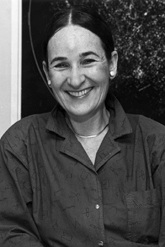What does it mean to say the universe is expanding? At the turn of the 21st century, the accelerating influence of "dark matter" --a new and unknown force-- focused national and international attention on questions about the origin and fate of the universe. One of the foremost scholars grappling with these questions is Professor Neta Bahcall, a pioneering astrophysicist in the field of observational cosmology and Eugene Higgins Professor of Astrophysics at Princeton University.
Originally from Israel, Professor Bahcall received her B.S. in physics and mathematics at Hebrew University, an M.S. in physics from the Weizmann Institute of Science, and her Ph.D. in astrophysics from Tel Aviv University.
Professor Bahcall is best known for her work in cosmic cartography, divining the structure and properties of the universe on large scales from massive sets of data accumulated through deep surveys of the sky and with the Hubble Space Telescope. She has been a pioneer in developing innovative techniques to interpret astronomical data, including a statistical approach to understanding how giant clusters of galaxies are distributed in the universe.
The determination of the mass density or total mass of the universe is among her most fundamental contributions to astrophysics. The mass density of the universe determines its ultimate fate, and Bahcall and her colleagues found that the universe has not only much less matter than previously thought, but far too little matter to halt the expansion begun with the Big Bang.
Professor Bahcall has authored or co-authored nearly 300 scholarly papers during her career, and is the recipient of numerous honors and awards. Elected to the National Academy of Sciences in 1997, she was a Nobel Lecturer at the Nobel Symposium in Stockholm in 1998, Capital Science Lecturer at the Carnegie Institution of Washington in 2000-01, and a Century Lecturer of the American Astronomical Society from 1999 to 2004.
Professor Bahcall began her career in the Physics Department of the California Institute of Technology and continued as Senior Research Astronomer for the Department of Astrophysical Sciences at Princeton University. During the 1980s, she served as the Head of the Science Program Selection Office and the Chief of the General Observer Support Branch of the Space Telescope Science Institute, where she selected the early science programs to be carried out with the Hubble Space Telescope. She returned to Princeton in 1989 as a Professor of Astrophysics, Director of the Undergraduate Program in Astrophysics, and Director for the Council on Science and Technology.
An active member of the astronomical profession, Professor Bahcall serves the community through many appointments to boards, including the National Astronomy and Astrophysics Advisory Committee and the Space Telescope Institute Council. Between 1995 and 1998, she served as Vice President of the American Astronomical Society (AAS). She has long been an advocate for women in science, and served as the Chair of the Committee on the Statue of Women in Astronomy of the AAS in 1983.


